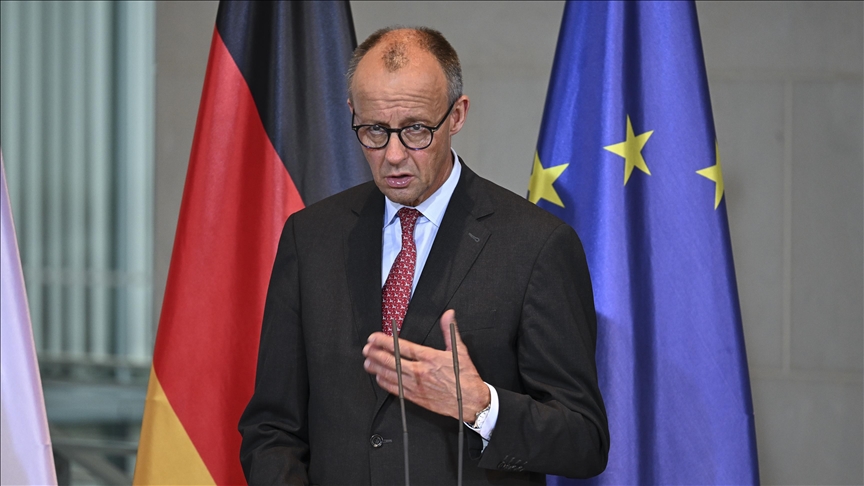European and Ukrainian interests must be safeguarded at Alaska summit, German chancellor says
After videoconference with Trump, Merz says recognition of Russian occupation in Ukraine is ‘not up for debate’
 Friedrich Merz
Friedrich Merz
BERLIN
German Chancellor Friedrich Merz stressed on Wednesday that European and Ukrainian interests must be safeguarded at the upcoming summit between US and Russian presidents in Alaska.
Speaking at a joint news conference with Ukrainian President Volodymyr Zelenskyy in Berlin, after joining a videoconference with US President Donald Trump, Merz said important decisions can be made at the Alaska summit on Friday.
"We Europeans are therefore doing everything in our power to set the course for this meeting in the right direction. We want President Donald Trump to succeed on Friday in Anchorage,” Merz said, referring to the upcoming summit in Alaska's largest city.
“Fundamental European and Ukrainian security interests must be safeguarded in Alaska. That was the message we as Europeans conveyed to US President Trump today, and I can say we were in strong agreement both in our assessment of the current situation and in the achievable goal for next Friday,” Merz said.
The conservative leader said European leaders have already outlined their expectations from the meeting last weekend, and their top diplomats have discussed these points in detail with the US side over the past few days.
“The American president knows that when the United States works toward peace in Ukraine that protects European and Ukrainian interests, then he can rely on our full support and count on it,” Merz said, and outlined five major points representing their expectations for the upcoming US-Russia talks.
“We have made it clear that Ukraine must be at the table as soon as there are follow-up meetings. We want negotiations to be conducted in the correct order. A ceasefire must be the starting point. Key elements should then be agreed upon in a framework agreement,” the chancellor said.
“Thirdly, Ukraine is willing to negotiate on territorial issues, but the so-called line of contact must be the starting point. And legal recognition of Russian occupation in Ukraine is not up for debate. The principle that borders may not be changed by force must continue to apply,” Merz stressed.
“Fourthly, negotiations must include robust security guarantees for Kyiv. The Ukrainian armed forces must be able to defend their country's sovereignty effectively, and they must also be able to count on Western aid in the long term. Fifth, negotiations must be part of a common transatlantic strategy; only then will they ultimately be most likely to succeed.”
The German chancellor also underlined Russia's failure to show willingness toward a diplomatic solution during the Alaska summit should result in consequences for Moscow.
“If there is no movement on the Russian side in Alaska, then the US and we Europeans should and must increase the pressure,” Merz said, referring to additional Western sanctions against Moscow.
“President Trump is aware of this position and has largely endorsed it. And that's why I can say we had a truly exceptionally constructive and positive conversation,” he added.
Merz hosted Zelenskyy for bilateral talks on the latest developments. Following their meeting, both leaders participated in the videoconference with Trump, joined by leaders from Ukraine's key allies.
The virtual meeting included leaders from France, the UK, Italy, Poland, and Finland, along with European Commission President Ursula von der Leyen, European Council President Antonio Costa, and NATO Secretary General Mark Rutte.
Anadolu Agency website contains only a portion of the news stories offered to subscribers in the AA News Broadcasting System (HAS), and in summarized form. Please contact us for subscription options.







